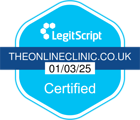Hyperhidrosis
What is Hyperhidrosis?
Hyperhidrosis is the medical term for excessive sweating. There are different types of hyperhidrosis and these are discussed below. Hyperhidrosis can be treated and there are a number of options available.
Can I get treatment online for hyperhidrosis?
There are some oral and topical treatments for hyperhidrosis available from The Online Clinic. Please complete an online consultation form to get an assessment from one of our doctors for the treatments available.
Types of hyperhidrosis
Everyone sweats. Sweating is a normal response to cool your body if it gets too hot or in response to emotions such as anxiety. Hyperhidrosis is an abnormal level of sweating from the eccrine (water-producing) sweat glands. Hyperhidrosis can be categorized as follows:
Localised Symmetrical Hyperhidrosis
This is the most common form of hyperhidrosis. It will normally start in childhood and can improve with age. The excessive sweating affects certain parts of the body and on both sides of the body (hence "symmetrical"). Patients may find that the palms of both hands are affected or the soles of both feet. Multiple body parts can be affected but not the whole body. The cause of excessive sweating in these discrete areas is not known. This type of hyperhidrosis is sometimes referred to a primary hyperhidrosis or focal hyperhidrosis.
Localised symmetrical hyperhidrosis is thought to run in families. Around a third of patients diagnosed with this type of hyperhidrosis will have a family member with the same condition.
Generalised Hyperhidrosis
This type of hyperhidrosis affects the whole body. It can be caused by infections or conditions such as diabetes or hyperthyroidism. Hormonal changes during the menopause is also known to cause generalised hyperhidrosis. Certain medications (such as antidepressants) are known to cause hyperhidrosis. You may sometimes see this type of hyperhidrosis referred to as secondary hyperhidrosis.
Treatments for hyperhidrosis
Aluminium Chloride Hexahydrate
Aluminium Chloride Hexahydrate is a type of antiperspirant in the form of a solution. It is applied topically to the affected areas. This preparation is only really suitable for localised hyperhidrosis. It is sold in pharmacies under the names Driclor and Anhydrol Forte.
Pro-Banthine
Pro-Banthine is prescribed in tablet form and is appropriate for patients with generalized hyperhidrosis. The medication is a type of drug called an anticholinergic. The medication blocks the signal between the nerves and the sweat glands. It contains Propantheline as the active ingredient and is available on prescription via The Online Clinic. More information can be found here.
Oxybutynin
Oxybutynin is, like Pro-Banthine, an anticholinergic drug. This medication is not specifically licensed for the treatment of hyperhidrosis but there is a lot of good evidence to suggest it is effective, so it can be prescribed by doctors “off-label”.
If the above treatments have failed, your doctor may refer you to a dermatologist. There are options available when medications have not been successful or when medications have not been well tolerated. Please see this website for more information: https://hyperhidrosisuk.org/treatment-options/
If your hyperhidrosis is the result of an underlying medical condition, treatment of that condition should lead to a resolution of your symptoms.
Self-Care Tips
There are things that you can do to avoid incidents of hyperhidrosis or to make yourself more comfortable when sweating.
Avoid the following:
- Alcohol or spicy foods - these can trigger sweating.
- Tight clothes or man-made fabrics, such as nylon - these can make sweating worse.
- Wearing sports shoes for everyday activities - this can make your feet sweat.
- Soap-based products can make sweating worse by drawing out moisture.
Consider the following recommendations:
- Absorbent underarm protectors can be bought from pharmacies. These will protect your clothes from embarrassing stains and make you more comfortable.
- Wear loose-fitting clothes made from natural fibres. Leather shoes are also advisable
- Cotton, silver and copper socks can help reduce sweating and odours that are secondary to the sweating.
You can find further helpful tips at HyperhidrosisUK.org
GMC registration number: 4524038

Date: 6 February 2024
Next review: 5 February 2026
All UK registered doctors can have their registration checked on
The Medical Register at the GMC website.







